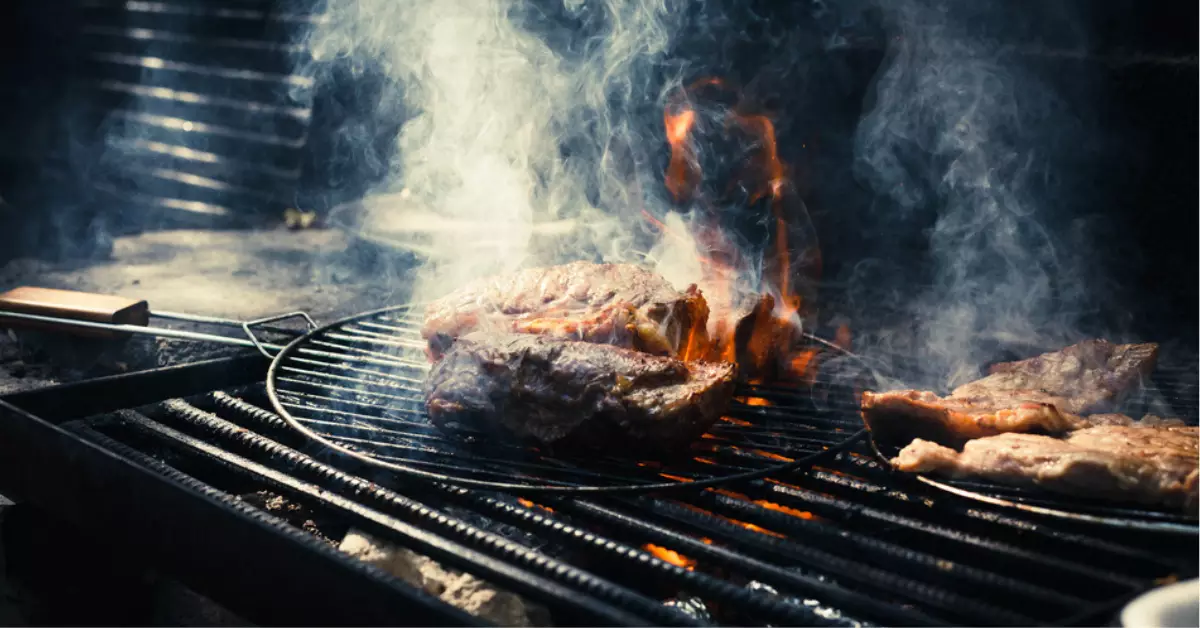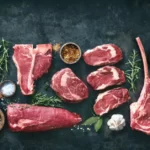Gout, a common form of inflammatory arthritis, often presents a painful challenge for those afflicted by it. Rooted in a buildup of uric acid crystals in the joints, it causes intense pain, redness, and swelling. Key triggers for this condition often include genetic predisposition, lifestyle choices, and significantly, dietary habits.
Diet indeed plays a significant role in managing gout. Certain food items, rich in purines – compounds that break down into uric acid in the body – can exacerbate the symptoms. One such food that often falls under the scanner is smoked meat, renowned for its distinctive flavor yet high purine content.
The relationship between smoked meat consumption and gout isn’t arbitrary but rooted in nutritional science and clinical research. Smoked meats and other high-purine foods, when consumed excessively, can elevate uric acid levels, thereby instigating or worsening gout symptoms.
Smoked Meat Overview
Understanding Smoked Meat
Smoked meat, a staple of many global cuisines, is created by flavoring and preserving meat through exposure to smoke from burning or smoldering plant materials, typically wood. Different woods provide unique flavors, resulting in the rich and varied world of smoked meats we enjoy today.
Nutritional Composition of Smoked Meat
The nutritional composition of smoked meat is as diverse as its flavor palate. Protein-rich and often high in fat, smoked meat is a good source of essential nutrients such as Vitamin B12 and Zinc. However, the smoking process doesn’t change the meat’s purine content, an important factor to consider for gout sufferers.
The Connection Between Smoked Meat and Gout
Role of Purines in Gout
Purines are organic compounds present in many foods, including smoked meat. When consumed and metabolized, purines break down into uric acid. Under normal conditions, the body is capable of maintaining an equilibrium between the production and excretion of uric acid.
However, an imbalance can occur when the intake of purine-rich foods is high or when the body’s excretory system is inefficient. This can lead to an excessive accumulation of uric acid in the bloodstream, a condition known as hyperuricemia.
When the concentration of uric acid in the body becomes too high, it can form sharp, needle-like crystals in the joints. These crystals incite an immune response, leading to the symptoms of inflammation, pain, redness, and swelling commonly associated with gout.
Purine Content in Smoked Meat
Meats, in general, are known to be high in purines, and smoked meats are no exception. The process of smoking meat does not significantly alter its purine content. Thus, the consumption of smoked meats can contribute to a higher dietary intake of purines.
Notably, the purine content can vary significantly between different types of meat. Organ meats, for example, are particularly high in purines, while some lean meats might contain comparatively lower amounts. Therefore, not all smoked meats contribute equally to the risk of gout.
How Smoked Meat Might Increase Gout Risk
As a food rich in purines, the consumption of smoked meat can contribute to an increased production of uric acid in the body. If this production exceeds the body’s capacity for excretion, it can result in a buildup of uric acid.
This excess uric acid can accumulate in the joints, forming sharp crystals that trigger inflammation and cause the painful symptoms characteristic of gout. Therefore, a regular and high intake of smoked meats might potentially increase the risk of developing gout or exacerbate existing symptoms.
Scientific Studies Supporting the Connection
Research Studies: Smoked Meat and Gout Risk
Several research studies have explored the connection between the consumption of purine-rich foods and the risk of gout. One such significant study was published in the New England Journal of Medicine, where researchers concluded that men with higher intakes of meat and seafood had an increased risk of gout compared to those with lower intakes.
While this study provides substantial evidence for the role of purine-rich foods in gout, it does not specifically isolate the impact of smoked meats. Nevertheless, it is reasonable to infer from the study’s findings that since smoked meats are high in purines, their consumption might also contribute to the risk of gout.
Limitations of the Current Research
Though current research suggests a potential link between the consumption of purine-rich foods and gout, more specific studies are needed to establish a concrete connection.
A key limitation is that most studies do not differentiate between various types of meats or cooking methods. For instance, there is no conclusive research specifically investigating the impact of smoked meats on gout risk compared to other forms of meat preparation, such as grilling or roasting.
Further research into the purine content of different types of smoked meats and their specific impact on uric acid levels and gout symptoms would provide a more comprehensive understanding of the issue.
Alternatives to Smoked Meat for Gout Patients
Low Purine Protein Sources
Even though gout patients need to limit their intake of purine-rich foods, it is not necessary to eliminate protein from their diet. Proteins are essential nutrients, crucial for various bodily functions such as cell growth, tissue repair, and immune function.
Fortunately, several low-purine protein sources are available, which can be included in a gout-friendly diet. These include:
- Eggs: A versatile source of protein, eggs can be included in various meals throughout the day.
- Nuts and seeds: These are rich in protein and also contain healthy fats. They can be used in salads, smoothies, or simply consumed as a snack.
- Low-fat dairy products: Low-fat options of milk, cheese, and yogurt are good sources of protein and have been associated with a reduced risk of gout.
Vegetarian Alternatives
Vegetarian proteins are generally low in purines and can be safely included in a gout-friendly diet. Some examples include:
- Lentils: High in protein and fiber, lentils are a good source of nutrition and can be used in a variety of dishes.
- Beans: Different types of beans, such as black beans, kidney beans, and chickpeas, provide good amounts of protein.
- Tofu: Made from soy, tofu is a complete protein and a good alternative to meats.
In addition to these, whole grains such as quinoa and brown rice also contribute to the protein content of the diet. Consuming a variety of these vegetarian proteins can help meet nutritional requirements without increasing the risk of gout.
Prevention and Management of Gout
Lifestyle Changes for Gout Prevention
While medical treatments are available for managing gout, lifestyle changes form a crucial part of prevention and control. Some recommended changes include:
- Limiting intake of high-purine foods: This includes not only smoked meats but also other high-purine foods such as organ meats, certain types of seafood, and alcoholic beverages.
- Maintaining a healthy weight: Excess weight can put pressure on the joints and may increase the risk of gout. Regular physical activity and a balanced diet can aid in weight management.
- Staying well-hydrated: Drinking plenty of fluids can help the body excrete uric acid more efficiently, reducing the risk of crystal formation.
- Moderating alcohol consumption: Alcohol, especially beer, is associated with an increased risk of gout as it can interfere with the removal of uric acid from the body.
Medical Treatment for Gout
In addition to lifestyle changes, medical treatments are often necessary for managing gout, particularly in severe or recurrent cases. These may include:
- Nonsteroidal anti-inflammatory drugs (NSAIDs): These are commonly used to reduce the inflammation and pain during a gout attack.
- Corticosteroids: These may be used when NSAIDs are not effective or cannot be used due to other medical conditions.
- Drugs that lower uric acid levels: Medications such as allopurinol and febuxostat are used to reduce the production of uric acid in the body, while probenecid helps increase the excretion of uric acid through the kidneys.
Regular consultations with healthcare professionals are necessary to monitor the condition, adjust treatments as necessary, and provide advice on diet and lifestyle changes.
Frequently Asked Questions
Can I never eat smoked meat if I have gout?
While it is advisable to limit the intake of purine-rich foods such as smoked meat, complete avoidance may not be necessary. It is possible to include small portions of smoked meat in the diet occasionally, without triggering a gout flare. However, each individual’s tolerance can vary, so it is recommended to consult with a healthcare professional for personalized advice.
Are all meats harmful for gout?
Not all meats have the same purine content. While organ meats are particularly high in purines, lean cuts of poultry and red meat have lower amounts and can be included in a gout-friendly diet in moderation. However, portion control and balance with other low-purine foods are important.
What are other high-purine foods to avoid?
In addition to smoked meat, other high-purine foods to be aware of include organ meats such as liver and kidneys, certain types of seafood like anchovies and sardines, and alcoholic beverages, especially beer.
Conclusion
Managing gout involves a comprehensive approach, taking into account various factors such as genetics, lifestyle, and diet. While smoked meat, with its high purine content, can potentially contribute to gout, it is just one part of the larger dietary picture.
It’s crucial to remember that managing gout is not merely about eliminating certain foods, but about balancing the intake of different nutrients. Consuming a variety of protein sources, maintaining a healthy weight, staying hydrated, and moderating alcohol intake are all part of a holistic approach to managing gout.
Individual responses to dietary changes can vary widely, and what works for one person might not work for another. Therefore, consulting with a healthcare professional or a dietitian can provide personalized advice, helping to create a balanced and sustainable diet plan that takes into account individual preferences, nutritional needs, and medical conditions.







